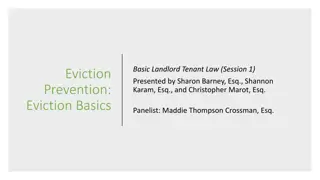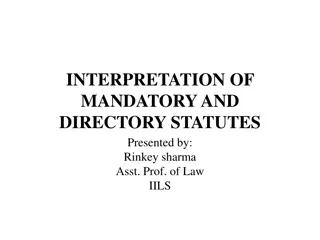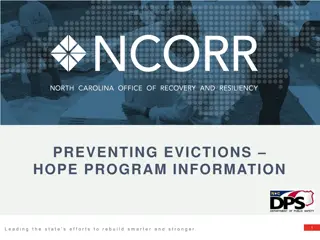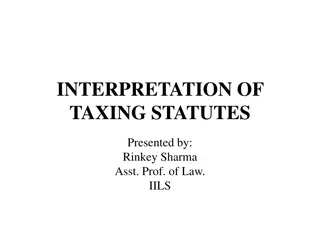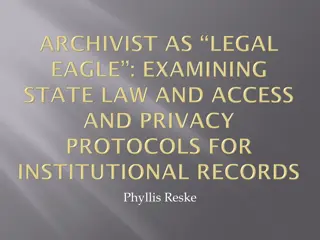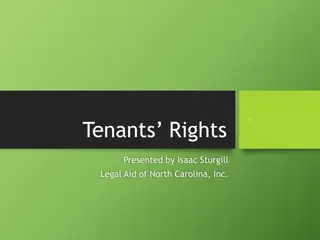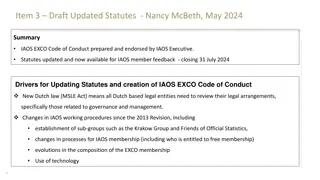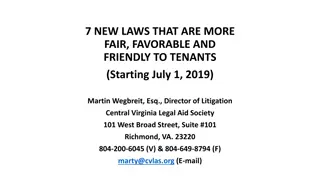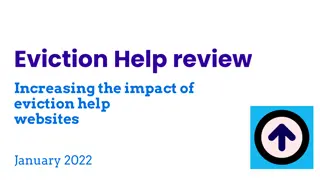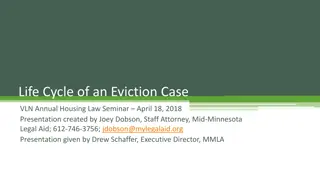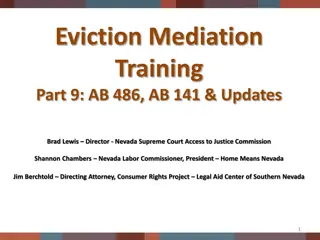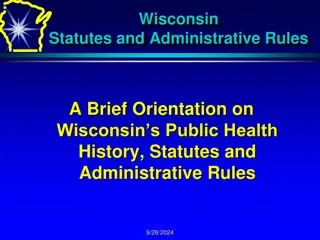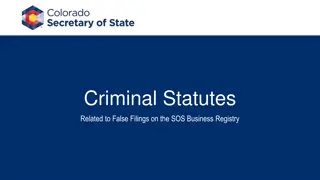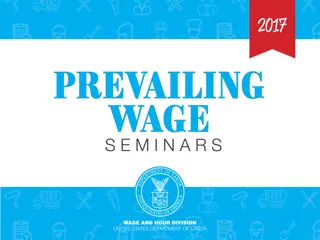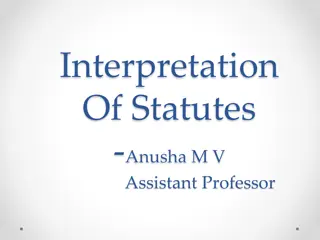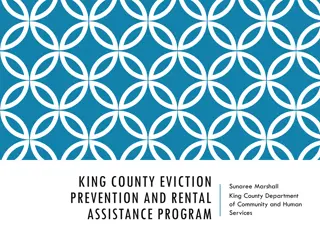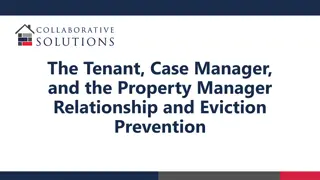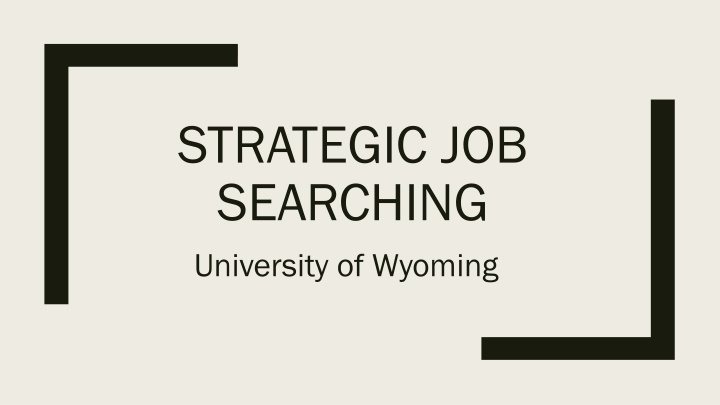
Eviction Defense and Statutes Overview
Explore key aspects of eviction defense, including procedures, statutes, affirmative defenses, and important definitions under Kansas laws. Get insights into rental agreements, terms, and conditions to navigate landlord-tenant disputes effectively.
Download Presentation

Please find below an Image/Link to download the presentation.
The content on the website is provided AS IS for your information and personal use only. It may not be sold, licensed, or shared on other websites without obtaining consent from the author. If you encounter any issues during the download, it is possible that the publisher has removed the file from their server.
You are allowed to download the files provided on this website for personal or commercial use, subject to the condition that they are used lawfully. All files are the property of their respective owners.
The content on the website is provided AS IS for your information and personal use only. It may not be sold, licensed, or shared on other websites without obtaining consent from the author.
E N D
Presentation Transcript
STRATEGIC JOB SEARCHING University of Wyoming
Business Realities Business Realities Road blocks = countries have employment laws; U.S. has limited # of work visas and permits; companies have been burned (intentional or unintentional) Costly and time-consuming: legal fees, paperwork, red tape, can take months; is a company willing/able to wait to fill a position? Companies have to prove why a non-citizen is more qualified than a U.S. citizen; a BS is pretty generic degree so hard to prove A MS degree could mean more qualified, and a PhD even more due to specific and different areas of expertise in subject area BUT, there are often less opportunities at a higher level of educaton
Business Realities, continued Business Realities, continued Must pay the Prevailing Wage; based on regional, not state: can be higher than what a company can pay Hiring employees is expensive; ROI on investment can be 3-5 years Where are expenses coming from? Work visa/permits have limited time at the beginning of a job; a company already knows their employee might leave before the ROI occurs STEM areas get additional years for work, based on degrees earned BS = 12 months + ??? (Jesse, do you know this?) MS = 12 months + ??? + ??? PhD = 12 months + ??? + ??? + ??? H-1B; OPT, CPT: UW International Student Services are best experts on all these rules
Strategies to Consider Strategies to Consider If its not too late, educate yourself in ways that sets you apart Earn a MS or PhD in something out of the ordinary For Example: (STEM) Sciences, Technology, Engineering, Math, Medical, Data Sciences, Agriculture, Construction Management, Surveying, Information Security Analyst, Software Developer, Postsecondary Education Teachers Start a Business, hire employees (easier said than done!)
Know about U.S. companies Know about U.S. companies Out of 100%, what % of companies in the U.S. have > 500 employees? What % have 100-499 employees? What % has < 100 employees? What % has < 20 employees?
Does This Surprise You? Does This Surprise You? 98.2 % of companies in the U.S. have < 100 employees 89.0 percent of companies in the U.S. have < than 20 workers 1.8% of companies in the U.S. have between 101-499 employees .3% of companies in the U.S. have > 500 employees Reference = Facts & Data on Small Business and Entrepreneurship Reference = Facts & Data on Small Business and Entrepreneurship https://sbecouncil.org/about-us/facts-and- data/#:~:text=According%20to%20data%20from%20the,the%20United%20States%20in%202016.&text=Firms%20with%20fewer%20than%2050 0,99.7%20percent%20of%20those%20businesses.&text=Firms%20with%20fewer%20than%20100%20workers%20accounted%20for%2098.2% 20percent.
Why does this matter? Why does this matter? Have you heard of Marathon Oil, Du Pont, Google, NASCAR, NASA? Have you heard of Ascend Performance Materials Operations, Ineos Nitriles USA LLC, Haldor Topsoe, Inc., Lifoam Industires? Switch thought process; don t follow the crowd Switch thought process; don t follow the crowd Hints: Large employers are easy to find = more applicants, harder to stand-out Smaller employers take time to find = less applicants, easier to stand-out What else about this strategy makes sense to you?
All candidates, regardless of international status, should prepare: should prepare: What do you want to do? Read job postings, used LinkedIn to see where alumni have worked, what are recent graduates with the same major doing? Improve your resume, cover letter, and LinkedIn profile Create a list of employers you are interested in working for; identify companies who hired international candidates in the past; identify companies who are smaller or lesser known Find alums and other contacts working for companies you are interested in Build relationships and gain advice from contacts; step outside of your comfort zone Apply for positions; ask contacts to introduce you to someone, or ask them if they will pass along your resume Prepare to interview by researching the company and practicing answers to common questions Know what the going salary is, know the market rate for similar positions, learn about benefit packages Know that generally companies hire people people with degrees, not degrees with people
Looking for H1B Companies https://www.visaplace.com/blog-immigration-law/top-10-h-1b-companies/ https://wyoming.joinhandshake.com/ www.glassdoor.com https://h1bgrader.com/ https://www.fairus.org/issue/workforce-economy/25-companies-hire-h-1b-workers www.buzzfile.com Talk to classmates, use LinkedIn, attend conferences, read resources
Contacts UW International Student Services will be your legal touch-point for the next few years; they will talk with employers having questions about hiring Keep them informed of employment issues, work status, etc. They are the UW experts on the legal issues around students/graduates being in the U.S. Jennie Hedrick, Assistant Director in College of Business, Peter Johnson and Paula Green Student Success Center; jnein@uwyo.edu Ann Jones, Associate Director in College of Engineering and Applied Science, Susan McCormack Center for Student Success; aljones@uwyo.edu

